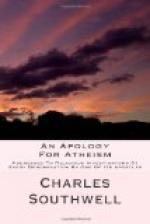By a late writer in the Edinburgh Review, we are told that ’some of the opinions avowed by Milton,’ were so ‘heterodox,’ as to have ’excited considerable amazement.’ We can scarcely conceive, says this writer, that any one could have read his Paradise Lost without suspecting him of heterodoxy; nor do we think that any reader acquainted with the history of his life, ought to be much startled by his opinions on marriage. The opinions which he expressed regarding the nature of the Deity, the eternity of matter, and the observation of the Sabbath, might, we think, have caused more just surprise. [95:1] Add to this good reader, Dr. Johnson’s statement, (’Lives of the Poets,’ p. 134, Art. Milton,) that in the distribution of his (Milton’s) hours there was no hour of prayer, either solitary or with his household; and then come, if you can, to the conclusion that he was a Christian.
The piety of Newton we are not prepared to dispute. It is certain he manufactured for himself a God, inasmuch as to space he ascribed the honor of being His sensorium. It is equally clear that he believed Christianity a divine system, inasmuch as he wrote, and rushed into print with, a lot of exquisite nonsense about the exquisitely nonsensical Apocalypse. But we defy pietists to ferret out of his religious writings, any argument in defence of religion, not absolutely beneath contempt; the best of them are execrably bad—mere ravings of a disordered and o’erwrought intellect. ‘The sublime Newton,’ said D’Holbach, ’is but a child when he quits physical science, to lose himself in the imaginary regions of theology.’ He failed, nevertheless, to achieve the favour, or escape the wrath, of thorough-going theologians who were in ecstacies at his childishness, but bitterly detested him, as they detested every man who had the audacity to open up new, and widen old fields, of investigation; to reject chimera and hold fast by fact in the pursuit of knowledge, and to teach a series of scientific truths, no ability can reconcile with the philosophy (?) of Jesus and Moses, who, according to wise Dr. Epps, never intended to teach man NATURAL SCIENCE, which he defines to be ‘God in Creation;’ but ’came to teach, in referring to natural events, SCIENTIFIC UNTRUTHS. [95:2]
The Author hopes that the opinions here advanced in reference to what may be named the Argument from ‘Authority,’ as contradistinguished from ‘Time,’ will make obvious to Christians themselves, that it is an unsafe argument, an argument which, like the broken reed, not only fails, but cruelly wounds the hand that rests upon it. Much evidence has been, and much more can be adduced to show that no prudent, well-informed Christian will say anything about the sanction lent to Christianity, or religion of any sort, by the writings of Newton, Milton, Bacon, and Locke. By admirers of such sanction, (?) this, our Apology for Atheism will, no doubt, be rejected with indignant contempt, but we venture to predict for it better treatment at the hands of those who are convinced that untruth can no more be scientific, than truth can be unscientific, and that belief, whether in the God of Nature, the God of Scripture, or the Scripture itself, opposed to Philosophy, must needs be opposed to Reason and Experience.




